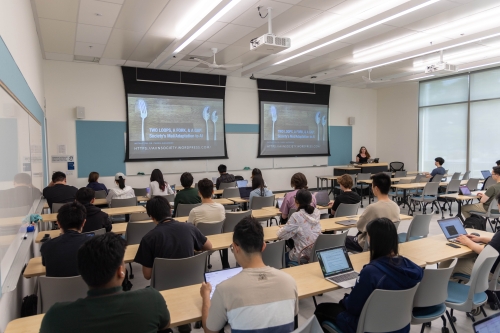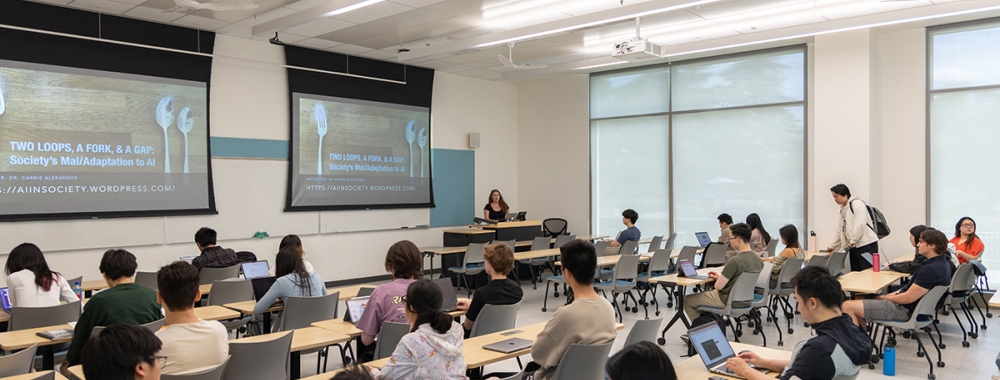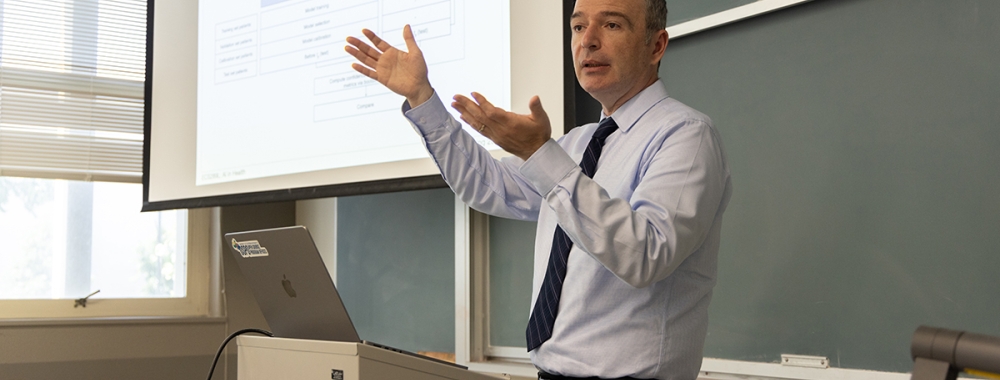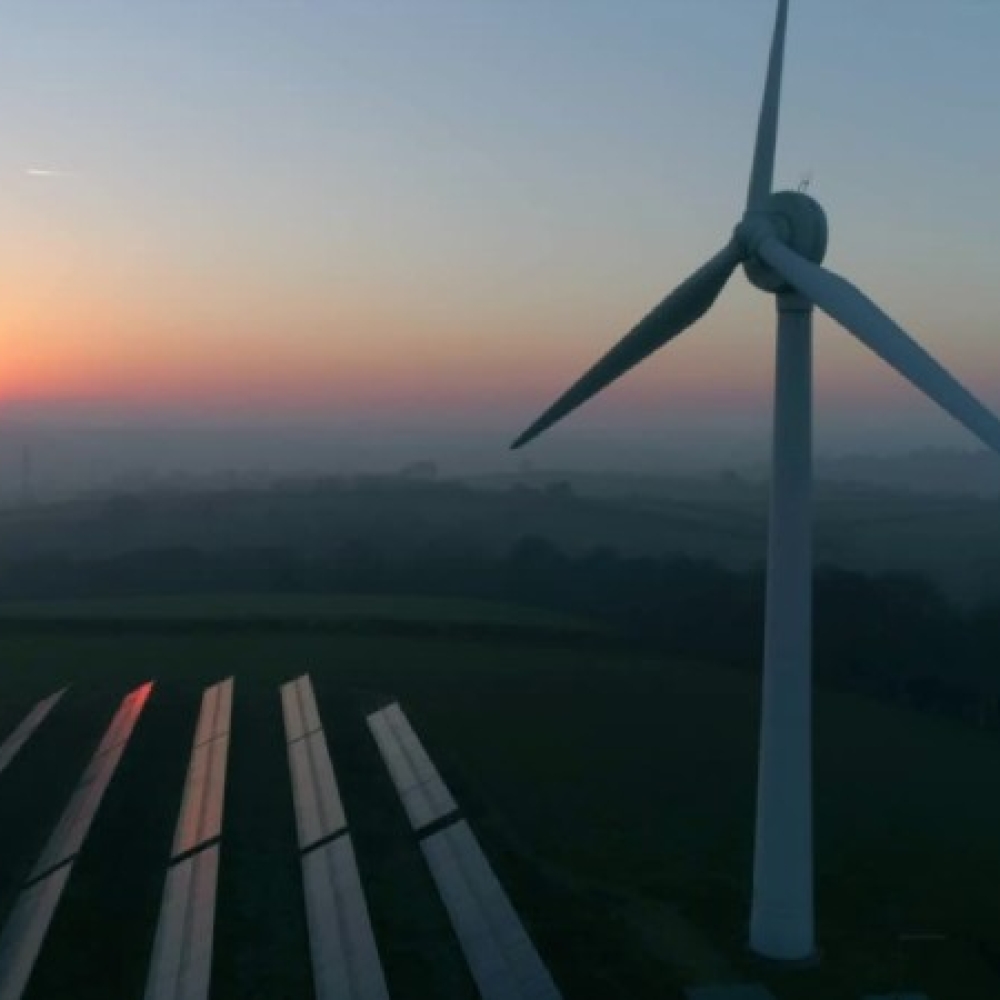
AI Education in the College of Engineering
The UC Davis College of Engineering has a vast list
of courses that explore artificial intelligence.
Biological and Agricultural Engineering | Biomedical Engineering | Civil and Environmental Engineering
Computer Science | Electrical and Computer Engineering | Mechanical and Aerospace Engineering
View full course descriptions, prerequisites and more on the UC Davis General Catalog.
Featured Courses

Artificial Intelligence for All
Comprehensive introduction to artificial intelligence (AI) and its multifaceted applications.

Artificial Intelligence in Health
Graduate course focused on solving real-world medical problems posed by health professionals.

Senior Design Projects in Applied Machine Learning
Two-part course that introduces teams of students to applied machine learning systems through a senior design project.
- TAE 010 — Introduction to Agricultural & Environmental Technologies (3 units)
- Ali Moghimi
Course Description: Technologies of agriculture and the environmental sciences. - EBS 189A — Special Topics in Biological Systems Engineering: Agricultural Engineering (1-5 units)
- Stavros Vougioukas
Course Description: Special topics in Agricultural Engineering.
- BIM 144 — Principles of Biophotonics (4 units)
- Randy Carney
Course Description: Principles of biophotonics, emphasizing quantitative description of light propagation, light tissue interactions, and working operation and design of biosensors and devices for optical imaging for detection of biomolecules. - BIM 146 — Biomedical Image Processing (4 units)
- Yi Xue
Course Description: Concepts and tools of digital image processing with focus on biomedical images.
- ECI 289E — Selected Topics in Civil Engineering: Structural Engineering (1-5 units)
- John Bolander
Course Description: Directed group study in Structural Engineering - ECI 289F — Selected Topics in Civil Engineering: Structural Mechanics (1-5 units)
- John Bolander
Course Description: Directed group study in Structural Mechanics.
- ECS 011 — Artificial Intelligence for All (4 units)
- Raissa D'Souza, Gabriel Simmons
Course Description: Comprehensive introduction to artificial intelligence (AI) and its multifaceted applications. - ECS 017 — Data, Logic, & Computing (4 units)
- Vladimir Filkov
Course Description: Display, processing, and representation of information and data on a computer. - ECS 132 — Probability & Statistical Modeling for Computer Science (4 units)
- Vladimir Filkov
Course Description: Univariate and multivariate distributions. - ECS 170 — Introduction to Artificial Intelligence (4 units)
- Lifu Huang
Course Description: Design and implementation of intelligent computer systems. - ECS 171 — Machine Learning (4 units)
- Maike Sonnewald
Course Description: Introduction to machine learning. - ECS 171 — Machine Learning (4 units)
- Ilias Tagkopoulos
Course Description: Introduction to machine learning. - EEC 174AY — Applied Machine Learning (3 units)
- Ilias Tagkopoulos
Course Description: Applied machine learning (ML) and deep learning (DL) in engineering systems. - ECS 174 — Computer Vision (4 units)
- Hamed Pirsiavash
Course Description: Computer vision is the study of enabling machines to "see" the visual world; e.g., understand images and videos. Explores several fundamental topics in the area, including feature detection, grouping and segmentation, and recognition. - ECS 179 — Gameplay Programming (4 units)
- Joshua McCoy
Course Description: Developing gameplay systems in the context of game design and software engineering. - ECS 271 — Machine Learning & Discovery (4 units)
- Muhao Chen
Course Description: Artificial intelligence techniques for knowledge acquisition by computers. - ECS 271 — Machine Learning & Discovery (4 units)
- Hamed Pirsiavash
Course Description: Artificial intelligence techniques for knowledge acquisition by computers. - ECS 282 — Advanced Natural Language Processing (4 units)
- Ilias Tagkopoulos
Course Description: Use of deep learning techniques in advanced natural language processing. - ECS 289G — Special Topics in Computer Science: Artificial Intelligence (1-5 units)
- Muhao Chen
Course Description: Special topic in Artificial Intelligence. - ECS 289G — Special Topics in Computer Science: Artificial Intelligence (1-5 units)
- Dongyu Liu
Course Description: Special topic in Artificial Intelligence. - ECS 289L — Special Topics in Computer Science: Computer Science (1-5 units)
- Hamed Pirsiavash
Course Description: Special topic in Computer Science. - ECS 289A — Special Topics in Computer Science: Computer Science Theory (1-5 units)
- Ilias Tagkopoulos
Course Description: Special topic in Computer Science Theory. - ECS 289G — Special Topics in Computer Science: Artificial Intelligence (1-5 units)
- Aditya Thakur
Course Description: Special topic in Artificial Intelligence. - ECS 289H — Special Topics in Computer Science: Computer Graphics (1-5 units)
- Hao-Chuan Wang
Course Description: Special topic in Computer Graphics.
- ECS 171 — Machine Learning (4 units)
- Yubei Chen
Course Description: Introduction to machine learning. - EEC 174AY — Applied Machine Learning (3 units)
- Chen-Nee Chuah
Course Description: Applied machine learning (ML) and deep learning (DL) in engineering systems. - EEC 175A — Internet of Things (3 units)
- Avesta Sasan
Course Description: Introduction to principles, technologies, challenges, and required expertise to build the Internet of Things (IoT) solutions. - EEC 175B — Internet of Things Senior Design Project (3 units)
- Avesta Sasan
Course Description: Propose and design a senior IoT design project, using the design principles they have studied in the prerequisite course, Internet of Things. - EEC 180 — Digital Systems II (5 units)
- Venkatesh Akella
Course Description: Computer-aided design of digital systems with emphasis on hardware description languages (VHDL), logic synthesis, and field-programmable gate arrays (FPGA). - EEC 201 — Digital Signal Processing (4 units)
- Zhi Ding
Course Description: Theory and design of digital filters. - EEC 264 — Estimation & Detection of Signals in Noise (4 units)
- Zhi Ding
Course Description: Introduction to parameter estimation and detections of signals in noise. - EEC 279 — Modern Parallel Computing (4 units)
- John Owens
Course Description: Exploration of the architecture of modern parallel computers, their programming models, and their programming systems. - EEC 284 — Design & Optimization of Embedded Computing Systems (4 units)
- Soheil Ghiasi
Course Description: Introduction to design and optimization of digital computing systems for embedded applications. - EEC 289Q — Special Topics in Electrical & Computer Engineering: Computer Engineering (1-5 units)
- Soheil Ghiasi
Course Description: Special topics in Computer Engineering. - EEC 289Q — Special Topics in Electrical & Computer Engineering: Computer Engineering
- Avesta Sasan
Course Description: Special topics in Computer Engineering.
- EME 109 — Experimental Methods for Thermal Fluids (4 units)
- Ben Shaw
Course Description: Experiments illustrating principles of thermal-fluid systems and related measurement devices. - MAE 207 — Engineering Experimentation & Uncertainty Analysis (4 units)
- Ben Shaw
Course Description: Design and analysis of engineering experiments with emphasis on measurement standards, data analysis, regressions and general and detailed uncertainty analysis, including statistical treatment of experimental data intervals, propagation of bias and precision errors, correlated bias approximations, and using jitter programs. - MAE 275 — Guidance & Control of Unmanned Aerial Systems (4 units)
- Zhaodan Kong
Course Description: Introduction to Unmanned Aerial Systems (UAS). - MAE 298 — Group Study (1-5 units)
- Shima Nazari
Course Description: Group study. - MAE 298 — Group Study (1-5 units)
- Iman Soltani
Course Description: Group study.
Engineering a better world calls for solutions of a different caliber, demanding innovation across disciplines using a design-centric approach.
We employ and develop intelligent systems and automation, tools at the nano-and-micro- scales and engineering for all that will revolutionize energy systems, strengthen climate resilience, advance human health and transform mobility to bring a sustainable, healthier and more resilient world within reach.





